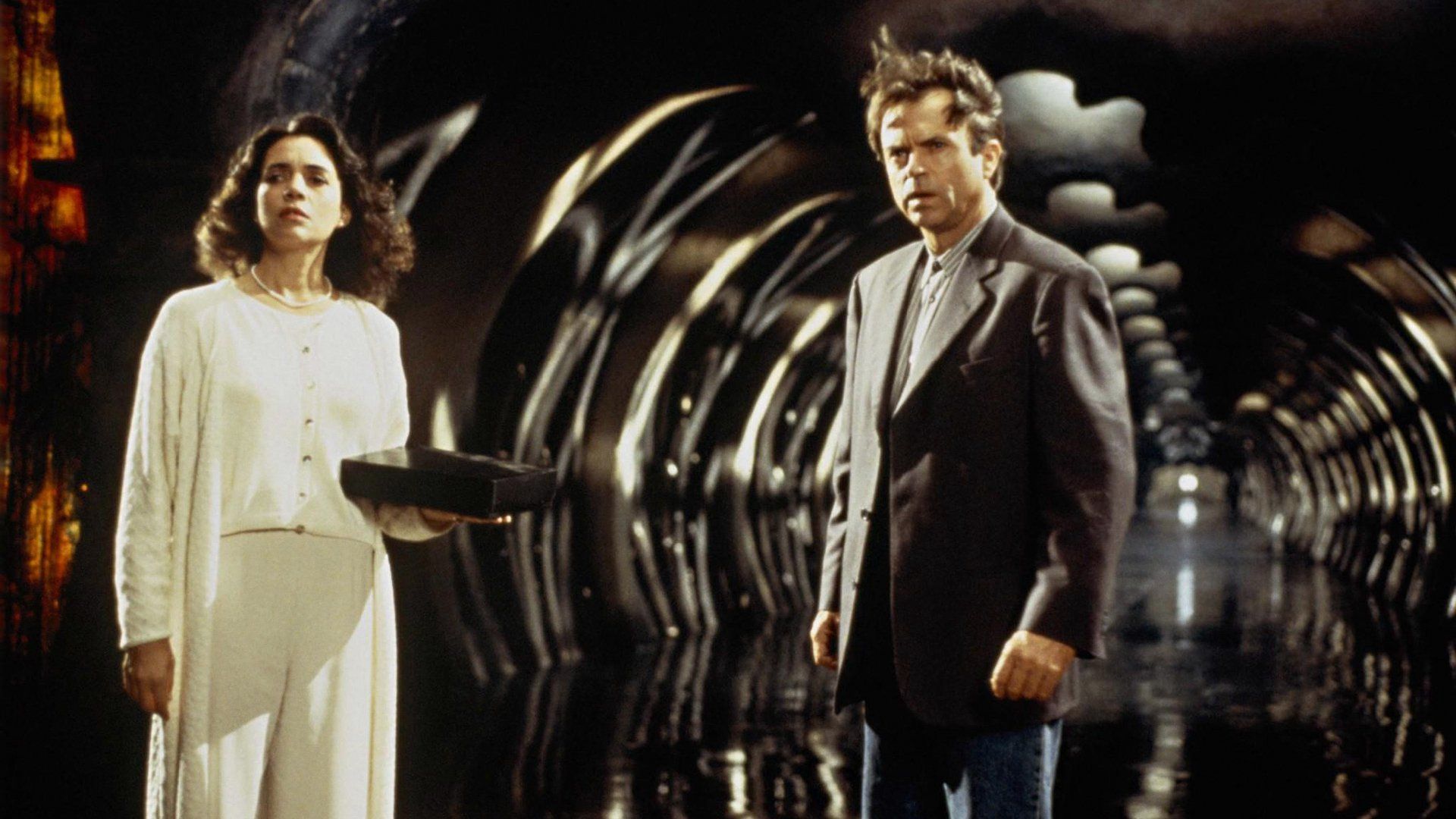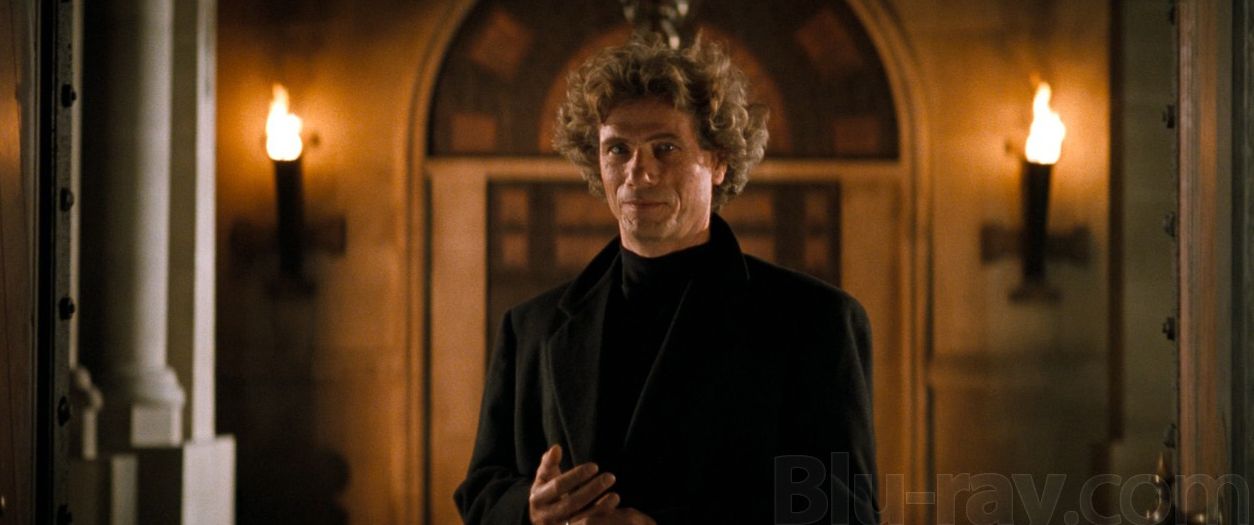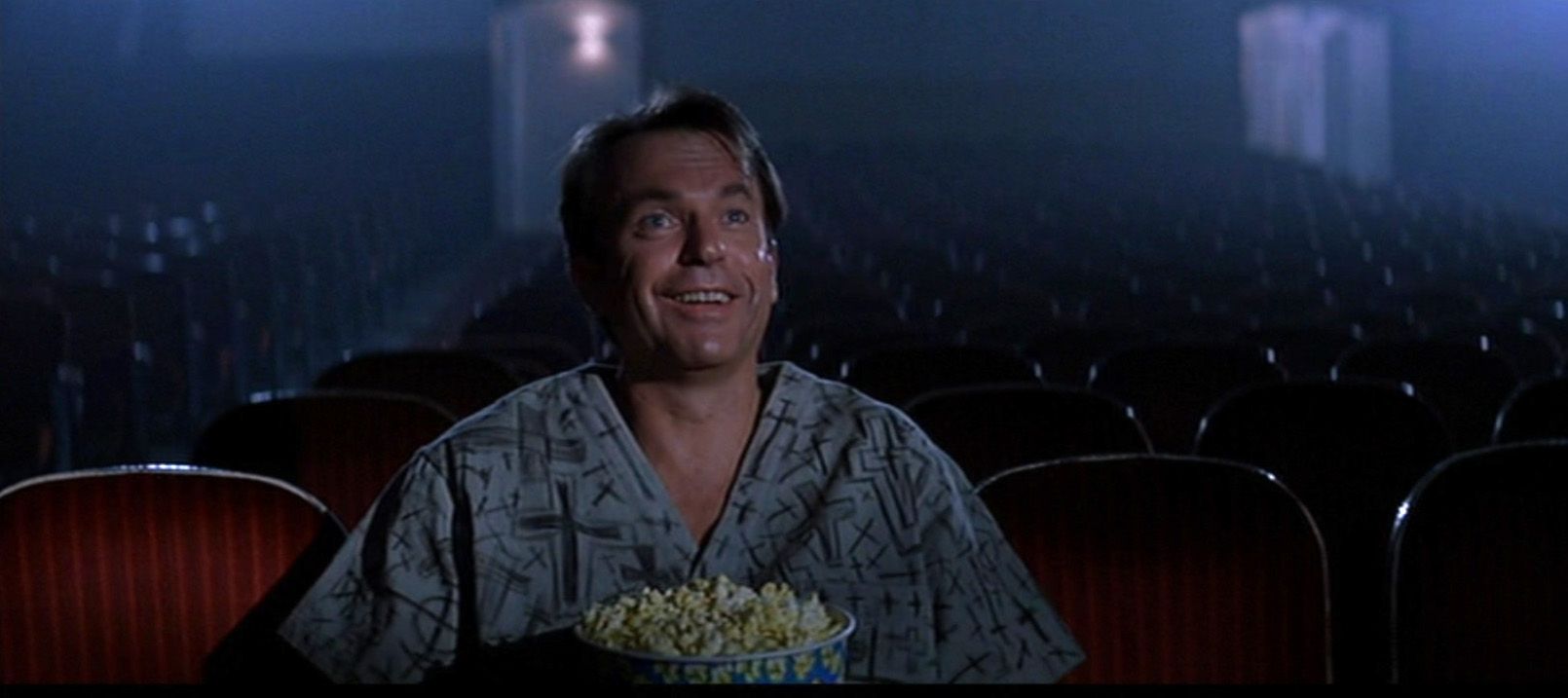
RETRO MOVIE REVIEW: In the Mouth of Madness
When it comes to John Carpenter and his Apocalypse Trilogy, most people remember The Thing (1984). While The Thing remains a timeless classic of SF/horror, the two following films unfortunately haven’t earned the same level of enduring popularity. The most forgotten of these was Prince of Darkness, a fascinating film that blends quantum physics and Exorcist-style horror, which I’ve discussed previously. However, Carpenter saved my personal favorite in the trilogy for last—In The Mouth of Madness, easily one of the best works of cosmic horror ever filmed. Though not a trilogy in the typical sense, this one is unified by a general idea– the world brought to the end through horrific forces beyond conventional understanding.
The beauty of In The Mouth of Madness is that it operates on a number of distinct but interesting levels. On a surface level, the film revolves around a skeptical insurance investigator’s search for a missing author, only for him to descend gradually into madness as he’s faced with insane horrors that he cannot explain or process. This is the very essence of cosmic horror, which deals with humanity being faced with powerful forces that it cannot comprehend or resist. However, digging deeper into the story, it becomes much more powerful and fascinating. This movie is making some pointed commentaries on the role of the author within the story, the growing idea of author as celebrity, the power of ideas to change people, and the relationship between the author and his characters. It’s very much a metafictional story that can be interpreted in different ways depending on what you bring to it. Moreover, this is a movie that benefits from multiple viewings, as it’s possible to find new things in it with each new viewing. Michael de Luca should be commended for writing such a deep and complex script, while remaining fundamentally a simple story at its core.

Much of this comes from the character of John Trent, played brilliantly by Sam Neill. Trent is a cynical man who sees the worst in people, always expecting a con or deception from everyone he encounters. Moreover, he is a character who always searches for a rational explanation for everything. This character represents the professional skeptic, a perfect contrast to the world of cosmic horror that he finds himself in. So when a man like Trent gradually succumbs to madness because he cannot find a rational answer, it reinforces the hopelessness and terror of the horrific situations presented in the film. His effectiveness as a main character also contrasts well with Linda Styles (played by Julie Carmen), the editor of Sutter Cane’s novels and a believer in the world that Cane has built. Although a dynamic that was perfected in later shows like The X-Files, the skeptic/believer pairing works very well in this movie. Trent has a clear character arc over the course of the film, showing how Trent falls to insanity and chooses to embrace it rather than face what reality has become.
However, if you happen to be a writer or are interested in the writing process, In the Mouth of Madness is an especially compelling story. The movie could be seen as the tale of a rogue character who tries and inevitably fails to escape the will of his author. This is a process that often happens to writers, where characters will act in unexpected ways in defiance of their creators. In this case, that impulse in understandable, since the writer is literally the author of their characters’ misfortune. The film illustrates to terrifying effect the kind of power the writer wields, both over the characters and over the audience. Although the writing itself is steeped in the work of H.P. Lovecraft, the inventor of cosmic horror, Sutter Cane’s public persona is closer to that of Stephen King (a friend and occasional collaborator of John Carpenter). Sutter Cane is what happens when the writer uses that power irresponsibly and self-indulgently, to use his influence in service of his own ambitions instead of the creation of art. In the hands of Cane, that power is truly destructive, not only for John Trent but for the audience and the entire world. At the same time, this film is also a commentary on the idea of the author as a cult of personality, a writer who seeks to become a god in the real world and not just in the imaginary landscape he’s created. The film presents an almost religious zealotry around the figure of Sutter Cane, warning against the dangers of that kind of fanatical belief. The way that the world is perceived defines what the world is to the audience, and Cane’s power over that audience brings doom to both. It’s a brilliantly crafted metafictional narrative, and it works perfectly while not detracting from Trent and his story in the slightest.

The centerpiece of this movie is Sam Neill in the role of John Trent, and Neill does an impressive job of holding the film together. Much of the strength of this movie is in watching Trent react to the insane things that happen around him. Neill brings a potent everyman charm to his portrayal of Trent, though maintaining the cynicism. Trent becomes a likable character in the beginning in no small part because of Neill’s charisma and personal charm. He also does well in managing Trent’s breakdown, as we watch Neill look more unnerved and unhinged as the movie progresses. Two particular standout scenes show how good he is here—the scene where Sutter Cane turns the world blue to make a point, and the finale, where Trent tries to join the audience and realizes that he’s too close to the story ever to see the world as they do. When Trent finally loses his mind, Neill sells those moments perfectly, and that is a difficult thing for an actor to pull off believably. Sam Neill is so good in this role that I have a difficult time imagining anyone else in this role even now—a testament to his skill in developing this character.
Beyond that, the cast of this film is an exceptional ensemble, with some impressive acting talent even in the film’s smaller roles. Julie Carmen is an actress that I’m largely unfamiliar with outside of this role, but she works well opposite Neill. As Styles, Carmen brings the right level of intensity to the role, and the sexual tension with Neill elevates the believer/skeptic dynamic between Styles and Trent. Jurgen Prochnow is outstanding as Sutter Cane, offering the right level of physical presence to make his status as cult figure believable. Prochnow’s performance is understated and he never once raises his voice in the entire film, but it brings a real sense of menace and dread because of this. Other actors are well known but contribute in small roles, all of them delivering the impact they need to. Charlton Heston only appears twice as Cane’s publisher, but in both cases, he brings the right level of authority. David Warner is an actor I’ve loved in numerous roles in film, TV, and video games, and he makes the most of his screen time opposite Neill here. John Glover likewise only really appears in the film’s framing devices, but he’s convincing as the deranged asylum orderly during the early minutes. Finally, although he’s only in a bit role, Star Wars fans should appreciate the appearance of a young pre-Anakin Hayden Christensen, who plays a paperboy who offers Trent directions late in the movie. Although there are many recognizable faces in this movie, they don’t distract from the main narrative, sinking well into their roles in this movie. The film mostly revolves around Neill, Carmen, and Prochnow, and these three provide a strong foundation on which the others stand.

If you’re looking for a Halloween film that leans more to Lovecraftian cosmic horror, In The Mouth of Madness will more than satisfy that itch. Not many filmmakers have done Lovecraftian horror effectively, but John Carpenter understands that style of horror and executes it well. Among Carpenter’s impressive filmography, this is one of his most fascinating to me, even more than some of the iconic movies that he’s made his name on. This movie is especially compelling if you’re interested in the craft of writing, since it offers some unique insights on the craft and the author’s role within the process. The result is a mind-blowing work of horror that crafts a unique metafictional experience, and that is something not many movies can credibly say.
Score: 5/5
Director/Composer: John Carpenter
Writer: Michael de Luca
Cast: Sam Neill, Julie Carmen, Charlton Heston, Jurgen Prochnow, John Glover, David Warner, Bernie Casey, Jason Peter, Frances Bay, Wilhelm von Homburg, Hayden Christensen
Author Profile
Latest entries










